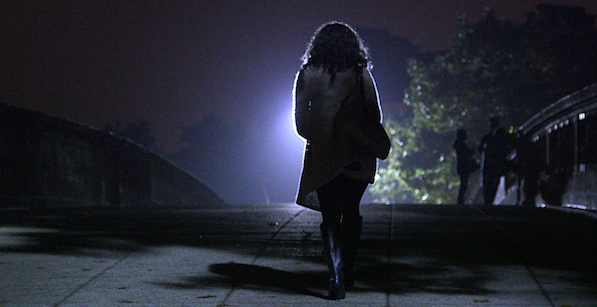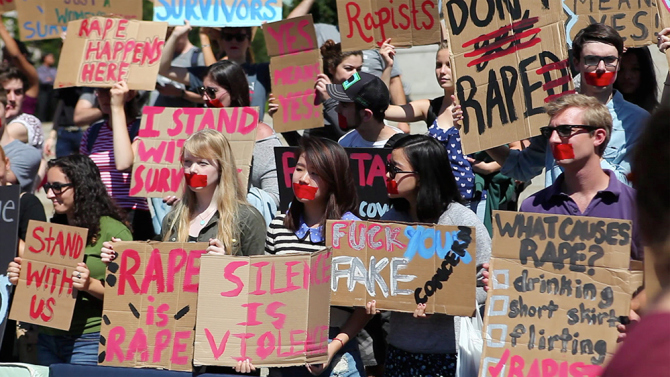
Surely the facts are enough to stand one’s hair on end: one in five women attending U.S. colleges will be raped.
Only a small number of these rapes are ever reported. And even a smaller number will result in prosecution of the rapists. In their new documentary The Hunting Ground, director Kirby Dick and producer Amy Ziering put a face on these statistics. They do this though highlighting the pioneering work of law students Andrea Pino and Annie Clark who have endeavored to force colleges and universities to enforce Title IX (the federal civil rights law that prohibits sex discrimination in education) and through often startling exposés of educational officials intent on soft-peddling or dismissing entirely the rapes that are taking place on their campuses.
It’s hard to decide which of the film’s many scenes is the most shocking—the one in which a female academic claims that a Florida State football player rape of a fellow student (explicated by Dick and Ziering in nearly exhaustive detail) was “consensual,” or the one where a gang of male students surround the residence of female rape protesters chanting in unison “No means Yes, and Yes means Anal.” What may happen in the future to the Florida State footballer, who is considered a frontrunner for the NFL draft, remains to be seen. Likewise whether the entire situation The Hunting Ground exposes will encourage a change in college and university policies.
I spoke to Dick and Ziering in Los Angeles as their film, which premiered at the Sundance Film Festival in January, opens in select theaters nationwide. (It is also scheduled for broadcast on CNN in the near future).
David Ehrenstein: Did The Hunting Ground evolve directly from your last film The Invisible War, which dealt with rape in the military?
Kirby Dick: In a sense, yes. We’d been working on an idea for a different film but in the course of going around to campuses and showing them The Invisible War we were told ‘a lot of what you’re exposing about the military is going on right here in our school.’
Amy Ziering: Then we started getting a lot of email about it. And so after about three months of this we felt we were obligated to respond to what we were hearing and began our investigation of the subject. It turned out to be even worse than we imagined.
Ehrenstein: In both instances you’re dealing with rapes that are not just covered up but aided and abetted systematically by institutions that have a lot at stake in keeping them at bay. With the military I can easily recognize the process at work. It’s a ‘law unto itself’ with its own rules and regulations and an inherent hostility to women from the get-go. Whereas for a great many people I’m sure it comes as a surprise that colleges and universities would be so much like them—sweeping rape under the carpet. But this time it’s to keep the institutions from ‘getting a bad reputation’ if any instance of rape is acknowledged, discouraging alumni financial donors and even more important to make sure the millions earned from college sports keeps coming in.
Ziering: I’m sure it will be a complete surprise to many people. There’s an intuitive sense that ‘Oh they would obviously side with the students. That would be their first priority and that’s where their concerns lie.’ But no. They were intent on covering up these crimes.
Ehrenstein: I found it truly shocking to see female academics brushing it all aside. She was as bad as those fraternity creeps—but in a ‘polite’ way.
Ziering: That was across the board. They were all like that. That’s part of the cultural biases—to preserve and protect the status quo, and the common misperception that rape is a ‘he said/she said’ situation. It’s not. A small percentage of men are rapists, but what makes it so terrible are the environments where they know these crimes won’t be properly adjudicated.
Ehrenstein: I found it was fascinating that you were able to get one convicted rapist to talk on camera—though his face isn’t shown.
Ziering: That was hard. It took forever to do. Most rapists don’t get convicted. And those that do won’t talk. But this one would.
Ehrenstein: This goes to the question of whether you’d consider making another film on the subject—this time about the psychopathology of rape.
Dick: That’s fascinating. And very much unexplored. Would we consider it? Hmm.
Ehrenstein: It would be difficult
Dick: Difficulty is a plus!

Ehrenstein: The term ‘rape culture’ is very much in the air right now. There’s this sense of an entire social matrix that contributes to perpetuation of rape because it’s not something taken seriously. Many people talk about it as ‘buyer’s remorse,’ or ‘dates gone wrong’ and the accusers become Fatal Attraction and on and on and on.
Dick: It’s part of the denial of this culture—or any culture I think—that rape actually happens. The impulse to cover it all up is very strong.
Ziering: It’s distasteful to people. They don’t want to see it. They want to turn away from it.
Dick: It’s part of misogyny. But maybe it goes beyond that. People say to themselves ‘This is not human behavior.’
Ehrenstein: They’re afraid because it deals with issues related to reproduction. It’s so basic—rape and trauma.
Ziering: You don’t want to hear news that might alter your way of being in the world. So people say, ‘This is exaggerated. Women are making it all up.’ They will grasp happily at any straw.
Ehrenstein: There have been several dramatic films that have dealt seriously with rape. Preminger’s Anatomy of a Murder (1959). Angelina Jolie’s In the Land of Blood and Honey (2011), about rape in the Bosnia war used as a weapon of violence against women. Likewise in Mike Hodges’ I’ll Sleep When I’m Dead (2003), in which Malcolm McDowell rapes Jonathan Rhys-Myers not out of passion or desire but to humiliate and destroy him.
Dick: Those films underscore the fact that rape revolves around issues of power and control. One survivor in our film described a serial predator who had been found responsible for rapes at the school multiple times. He would pick out somebody strong and try to break them down. The assault was part of breaking them down. He would go after an intelligent, high achieving woman—not the young, innocent and vulnerable, which is usually the kind of person rapists choose to assault. He wanted a bigger thrill.
Ehrenstein: How do you see your progression over the years. We’re far from Jacques Derrida with a film like this.
Dick: Not as far as you might imagine. The films Amy and I have made together, Outrage (2009), Derrida (2002), The Invisible War (2012) and now The Hunting Ground, all deal with sexuality and power in one way or another.
Ehrenstein: Sexuality is very much in the forefront of your film about the MPAA ratings board, This Film is Not Yet Rated (2006). I was talking about this a few weeks back with Jacqueline Bisset because of the film she made with Gerard Depardieu, Welcome to New York by Abel Ferrara. It’s about the Dominique Straus-Kahn affair and will doubtless have to to go under the knife to avoid the dreaded NC-17 rating. She said ‘It’s amazing how sex is dirty and violence is clean. Had the film shown a whole lot of killings it would be perfectly OK.’
Dick: She’s right, violence is ‘clean.’ You know, that’s a great subject for a film.



